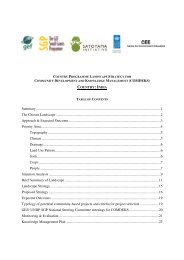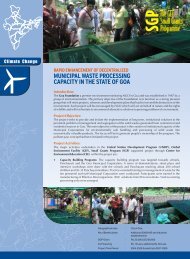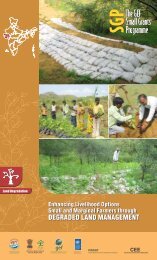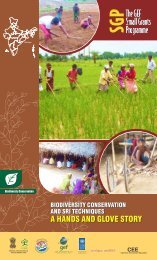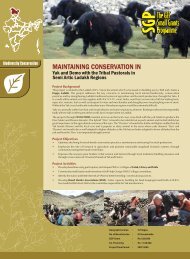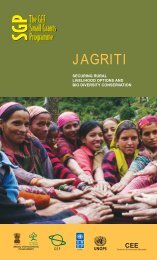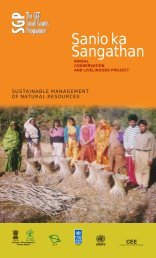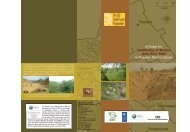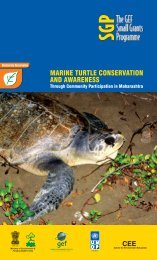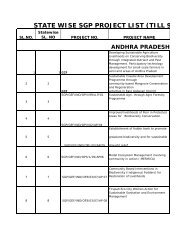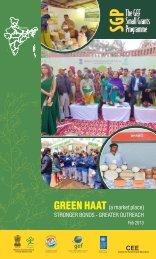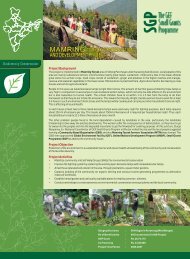minutes of the workshop held at pune from 7-9 january ... - SGP India
minutes of the workshop held at pune from 7-9 january ... - SGP India
minutes of the workshop held at pune from 7-9 january ... - SGP India
- No tags were found...
You also want an ePaper? Increase the reach of your titles
YUMPU automatically turns print PDFs into web optimized ePapers that Google loves.
MINUTES OF THE WORKSHOP HELD AT PUNE FROM 7‐9 JANUARY 2013<br />
TO OPERATIONALIZE THE GEF/UNDP <strong>SGP</strong> OP5 PROGRAM<br />
Participants: As per list <strong>at</strong>tached – Annex 1<br />
Agenda : Enclosed as Annex 2.<br />
Venue: Yashwantrao Chavan Academy <strong>of</strong> Development Administr<strong>at</strong>ion, Pune<br />
Background:<br />
With <strong>the</strong> signing <strong>of</strong> <strong>the</strong> Project Document for GEF/UNDP <strong>SGP</strong> OP5 program and in order to align GEF<br />
/UNDP <strong>SGP</strong> CEE’s str<strong>at</strong>egies; how now <strong>the</strong> analysis <strong>of</strong> <strong>the</strong> proposals needs to be done; wh<strong>at</strong> are <strong>the</strong><br />
new ways and targets th<strong>at</strong> need to be achieved in <strong>the</strong> project in respective <strong>the</strong>m<strong>at</strong>ic areas; and how<br />
innov<strong>at</strong>ion, replic<strong>at</strong>ion and use <strong>of</strong> technology and scaling up needs to be done keeping in line with<br />
<strong>the</strong> outcomes and outputs <strong>of</strong> <strong>the</strong> project. It was mutually decided to have a three day <strong>workshop</strong> with<br />
all <strong>the</strong> Regional Coordin<strong>at</strong>ors <strong>of</strong> CEE and <strong>the</strong> team working on GEF <strong>SGP</strong>. It was also to use this as an<br />
opportunity to decide on <strong>the</strong> Regional Committees and <strong>the</strong> N<strong>at</strong>ional Steering Committee members,<br />
revise form<strong>at</strong>s and agree on common standard oper<strong>at</strong>ing systems (SOPs). Understand <strong>the</strong> timelines,<br />
proposals th<strong>at</strong> were received by <strong>the</strong> Central Program Management Unit <strong>at</strong> Delhi were handed over<br />
to <strong>the</strong> RCs, in case <strong>the</strong> copies were not available with <strong>the</strong>m to start preparing for <strong>the</strong> Regional<br />
Committee meetings. The three‐day activities also included exposure to new technologies for<br />
linking up with <strong>the</strong> projects in <strong>the</strong> field, followed by two field visits on 8 th and 9 th afternoon to closer<br />
project demonstr<strong>at</strong>ion sites to expand <strong>the</strong> horizon <strong>of</strong> <strong>the</strong> participants on <strong>the</strong> quality <strong>of</strong> activities<br />
being done around Pune.<br />
4 JANUARY 2013:<br />
After a brief introductory session by Mr. Prabhjot Sodhi on <strong>the</strong> purpose <strong>of</strong> <strong>the</strong> <strong>workshop</strong>, <strong>the</strong><br />
unveiling <strong>of</strong> <strong>the</strong> project document was done by Sh Kartikeya V Sarabhai, Director CEE; Dr. Ruchi Pant<br />
<strong>of</strong> UNDP. At <strong>the</strong> Outset he congr<strong>at</strong>ul<strong>at</strong>ed mr sodhi for <strong>the</strong> untiring efforts to get this document going<br />
and <strong>the</strong> project agreed and signed, he added th<strong>at</strong> <strong>at</strong> times it seemed we are not getting it. L<strong>at</strong>er Mr<br />
Sarabhai mentioned….<br />
‐ This is for <strong>the</strong> first time in <strong>the</strong> world th<strong>at</strong> an NGO has been design<strong>at</strong>ed as <strong>the</strong> executing agency <strong>of</strong><br />
GEF – CEE as a civil society organiz<strong>at</strong>ion.<br />
‐ With this responsibility entrusted on us, CEE accountability to GEF and UNDP goes up<br />
tremendously. Therefore we need to be proactive in delivering <strong>the</strong> quality outputs becomes a<br />
challenge for us. He also briefed on <strong>the</strong> history <strong>of</strong> how we got <strong>the</strong> <strong>SGP</strong> in <strong>India</strong> as an NHI.<br />
‐ He added <strong>the</strong>refore we all need to understand <strong>the</strong> nitty‐gritties <strong>of</strong> GEF project monitoring and<br />
Systems and Rules & Regul<strong>at</strong>ions <strong>of</strong> UNDP. UNDP in this case will also play <strong>the</strong> project assurance<br />
role and will also focus on <strong>the</strong> quality outputs.<br />
‐ He stressed th<strong>at</strong> we need all who travel to send a report in <strong>the</strong> form<strong>at</strong> you will agree timely and<br />
qualit<strong>at</strong>ively. Different periodicities <strong>of</strong> reporting & monitoring and financial procedures will be<br />
followed with GEF– follows july‐june; UNDP follows a calendar year whereas MoEF, GOI/CEE follows<br />
GOI financial year <strong>from</strong> april‐march. He added in order to m<strong>at</strong>ch with <strong>the</strong>se expect<strong>at</strong>ions, we need to<br />
do monthly planning & reporting for which forms will be circul<strong>at</strong>ed to you by Mr. sodhi.<br />
‐He added th<strong>at</strong> <strong>the</strong> OP 05 program is much different <strong>from</strong> all <strong>the</strong> oper<strong>at</strong>ional phases completed so<br />
far. We now need to have a direct outcome/outputs based approach and are expected to provide<br />
clear calcul<strong>at</strong>ions like <strong>the</strong> amount <strong>of</strong> co2 emissions reduced through <strong>the</strong> projects and <strong>the</strong> amount <strong>of</strong><br />
degraded land brought for additional cultiv<strong>at</strong>ion. We no more can afford to deal with each single<br />
project in isol<strong>at</strong>ion. He added th<strong>at</strong> complete details <strong>of</strong> expected outcomes are listed under <strong>the</strong><br />
logical framework analysis in <strong>the</strong> project document, encouraged all colleagues should look <strong>at</strong> <strong>the</strong>se<br />
expect<strong>at</strong>ions in gre<strong>at</strong>er details and work on <strong>the</strong> proposals <strong>at</strong> <strong>the</strong> project design stage keeping in<br />
mind <strong>the</strong>se criteria. Lastly he welcomed and thanked one and all for successful <strong>workshop</strong>.
7 JANUARY 2013:<br />
A brief talk was made by Mr. Sodhi, Country Program Manager (CPM), GEF/UNDP Small Grants<br />
Program and l<strong>at</strong>er Ms Ruchi Pant and Ms. Shailaja Ravindran<strong>at</strong>han‐CEE; Ms. Sanskriti Menon‐CEE;<br />
made <strong>the</strong>ir points as,<br />
Dr. Ruchi Pant briefed th<strong>at</strong>:<br />
Oper<strong>at</strong>ional Phase 5 is a new start for <strong>SGP</strong> in <strong>India</strong> where UNDP will act as <strong>the</strong> GEF<br />
Implementing Agency and will act as a direct partner <strong>of</strong> GEF <strong>SGP</strong> and play <strong>the</strong> project<br />
assurance role.<br />
<strong>SGP</strong> <strong>India</strong> is one <strong>of</strong> <strong>the</strong> best performing programs across <strong>the</strong> world in <strong>the</strong> <strong>SGP</strong> network.<br />
GEF <strong>SGP</strong> is <strong>the</strong> only program where UNDP directly engages with <strong>the</strong> community and provides<br />
a gre<strong>at</strong> networking opportunity in <strong>the</strong> country.<br />
<strong>SGP</strong> is a significant program for UNDP as it is <strong>the</strong> only program where UNDP works directly<br />
with <strong>the</strong> civil society organiz<strong>at</strong>ions.<br />
The <strong>SGP</strong> money, though small, acts as a c<strong>at</strong>alyst th<strong>at</strong> helps <strong>the</strong> NGOs to link up with bigger<br />
projects and <strong>the</strong> government programs.<br />
UNDP being <strong>the</strong> Executing Agency for many o<strong>the</strong>r GEF full/medium scale projects in <strong>India</strong>,<br />
can link up <strong>SGP</strong> with o<strong>the</strong>r such programs <strong>of</strong> GEF to bring larger impacts on <strong>the</strong> ground.<br />
UNDP is presently implementing about 40 GEF projects (FSPs/MSPs) and CEE’s Regional<br />
Offices should look for future linkages. Hence, <strong>the</strong> <strong>SGP</strong> CPMU should share <strong>the</strong> list <strong>of</strong> all CEE<br />
Regional Offices so th<strong>at</strong> <strong>the</strong>y could be invited for <strong>the</strong> UNDP <strong>workshop</strong>s/events in <strong>the</strong>ir<br />
regions. Dr. Pant assured th<strong>at</strong> she will try to particip<strong>at</strong>e in <strong>the</strong> Regional Committee meetings<br />
to ensure quality linkages with <strong>the</strong> GEF/UNDP <strong>SGP</strong>.<br />
Mr. Simantha Kalita briefed about <strong>the</strong> mainstreaming <strong>of</strong> <strong>SGP</strong> initi<strong>at</strong>ives with <strong>the</strong> Government <strong>of</strong><br />
Tripura on waste management through <strong>the</strong> Municipality <strong>of</strong> Agartala.<br />
Ms. Shailaja put forward <strong>the</strong> following points:<br />
<br />
<br />
<br />
<br />
For CEE, GEF/UNDP <strong>SGP</strong> is an educ<strong>at</strong>ion used <strong>at</strong> <strong>the</strong> ground level and educ<strong>at</strong>ion gained <strong>from</strong><br />
<strong>the</strong> ground level.<br />
There is a need to standardize various form<strong>at</strong>s for reviewing project proposals.<br />
The volume <strong>of</strong> <strong>the</strong> <strong>SGP</strong> program vis‐a‐vis finance is one <strong>of</strong> <strong>the</strong> major concern areas.<br />
Networking is required with external/<strong>the</strong>m<strong>at</strong>ic institutions and <strong>the</strong> capacity building <strong>of</strong> CEE’s<br />
internal staff and <strong>the</strong> NGOs.<br />
Ms. Menon stressed th<strong>at</strong> <strong>the</strong>:<br />
Project management is one <strong>of</strong> <strong>the</strong> most important components <strong>of</strong> <strong>the</strong> <strong>SGP</strong> program.<br />
Flow <strong>of</strong> communic<strong>at</strong>ion is very important for <strong>the</strong> success <strong>of</strong> <strong>the</strong> program.<br />
Evalu<strong>at</strong>ion <strong>of</strong> <strong>the</strong> proposals should be done keeping <strong>the</strong> larger picture in mind.<br />
Strong and quality inputs to NGOs and CBOs in particular and <strong>the</strong>ir hand‐holding are<br />
required, <strong>the</strong>refore we all need to work hard. She <strong>at</strong> <strong>the</strong> outset congr<strong>at</strong>ul<strong>at</strong>ed Sodhi and <strong>the</strong><br />
<strong>SGP</strong> team in Delhi for <strong>the</strong>ir strenuous efforts in making this program happen.<br />
Mr. Sodhi shared with <strong>the</strong> participants about <strong>the</strong> sad demise <strong>of</strong> Mr. Danielius P and a two <strong>minutes</strong><br />
silence was observed by all <strong>the</strong> participants in his memory and as a mark <strong>of</strong> respect.<br />
Mr. Sodhi took <strong>the</strong> <strong>workshop</strong> proceedings forward by giving a present<strong>at</strong>ion on <strong>the</strong> GEF/UNDP <strong>SGP</strong><br />
OP5 th<strong>at</strong> covered mainly <strong>the</strong> following points:<br />
Project details <strong>of</strong> <strong>the</strong> GEF <strong>SGP</strong> OP 5, with various d<strong>at</strong>es/milestones and details <strong>of</strong> cash c<strong>of</strong>unding<br />
linked <strong>at</strong> <strong>the</strong> Program level by priv<strong>at</strong>e sector partners, MoEF and UNDP.<br />
The project Organogram was shared with <strong>the</strong> roles <strong>of</strong> MoEF, UNDP, NSC, RCs, CPMU and <strong>the</strong><br />
Regional Advisory Committee defined.<br />
The primary Outcomes and Secondary Outputs, as defined by UNDP were explained.
Explained th<strong>at</strong> OP5 is a Full Scale project in place <strong>of</strong> <strong>the</strong> annual RAF Grants and UNDP’s Core<br />
funding.<br />
GEF now brings in <strong>the</strong> concept <strong>of</strong> QQT (Quality, Quantity and in‐Time) in <strong>the</strong>ir projects.<br />
Develop linkages with vast range <strong>of</strong> stakeholders, like St<strong>at</strong>e Biodiversity Boards, St<strong>at</strong>e<br />
Renewable Energy Departments, W<strong>at</strong>ershed Departments, Land Development<br />
Boards/Agriculture/KVKs/Director‐Research & Director‐Extension, W<strong>at</strong>er Managements,<br />
Municipal Commissioners, St<strong>at</strong>e Pollution Control Boards, Research & Test Labs., etc.<br />
There should be more focus on n<strong>at</strong>ional priorities and links should be established with<br />
n<strong>at</strong>ional institutions, programs and <strong>the</strong>re is a need to understand clearly <strong>the</strong> “Concept <strong>of</strong><br />
Leveraging” resources.<br />
Link with good CSR Actions/Found<strong>at</strong>ions.<br />
Work with Industry Associ<strong>at</strong>ions – on energy efficiency in small scale sectors (eg. Foundry,<br />
Copper, Glass, Ceramics, Metal Etc.).<br />
Work with UNDP and link up <strong>the</strong> GEF/<strong>SGP</strong> projects with <strong>the</strong>ir MSPs and FSPs, as explained by<br />
Ruchi.<br />
We and <strong>the</strong> NGOs must learn about building business models for programs.<br />
Them<strong>at</strong>ic‐area wise fund alloc<strong>at</strong>ion was explained (which fall under three different<br />
Conventions) for developing new proposals.<br />
He explained th<strong>at</strong> mentoring; monitoring and hand‐holding <strong>of</strong> CSOs is a continuous process.<br />
He insisted th<strong>at</strong> in order to achieve <strong>the</strong> above, we should respond quickly, with flexibility,<br />
adopt simple‐low cost measures and innov<strong>at</strong>ive ways <strong>of</strong> working, th<strong>at</strong> could involve risk<br />
taking.<br />
Biggest challenge is to be active, enthusiastic and pro‐active all <strong>the</strong> time, with high<br />
expect<strong>at</strong>ions. Rel<strong>at</strong>ion building is <strong>the</strong> most important and is a win‐win‐situ<strong>at</strong>ion, though it is<br />
easy to form but is difficult to maintain.<br />
He explained <strong>the</strong> importance <strong>of</strong> Village based agreements.<br />
Briefed about <strong>the</strong> Inception Workshop th<strong>at</strong> is proposed to be <strong>held</strong> in March 2013.<br />
The post lunch session commenced with a present<strong>at</strong>ion on “Wh<strong>at</strong> Is Different – Expect<strong>at</strong>ions <strong>from</strong><br />
OP5 Pro doc” by Mr. Anil Arora. Mr. Arora highlighted <strong>the</strong> following points on <strong>the</strong> difference in GEF<br />
UNDP <strong>SGP</strong> OP5 project over <strong>the</strong> earlier Oper<strong>at</strong>ional Phases 1 to 4:<br />
<br />
<br />
<br />
<br />
<br />
<br />
<br />
<br />
<br />
UNDP is <strong>the</strong> GEF Implementing Agency<br />
CEE is <strong>the</strong> GEF Executing Agency (Implementing Partner in <strong>the</strong> UNDP terms).<br />
The program will follow <strong>the</strong> UNDP rules, procedures, financial management, oper<strong>at</strong>ing and<br />
reporting systems.<br />
For dealing with project funds, CEE procurement and o<strong>the</strong>r administr<strong>at</strong>ive procedures will be<br />
followed.<br />
The NSC will be <strong>the</strong> deciding body and act as <strong>the</strong> Program Board.<br />
The N<strong>at</strong>ional Coordin<strong>at</strong>or will be design<strong>at</strong>ed as <strong>the</strong> Country Program Manager as per <strong>the</strong><br />
design<strong>at</strong>ion provided to all <strong>the</strong> Managers <strong>of</strong> <strong>the</strong> Ten Upgraded Countries.<br />
The new donors are S<strong>at</strong>oyama Initit<strong>at</strong>ive, WFP, SDC, Bajaj Found<strong>at</strong>ion, in addition to <strong>the</strong><br />
funding <strong>from</strong> UNDP and MoEF.<br />
Expect<strong>at</strong>ions and quality <strong>of</strong> proposals and <strong>the</strong> geographical focus for each donor may differ,<br />
although <strong>the</strong>se projects will fall within <strong>the</strong> overall <strong>SGP</strong>‐funding modality and will be<br />
governed by <strong>the</strong> SOPs established by GEF.<br />
The reporting periodicities vary as GEF follows July‐June period; UNDP follows <strong>the</strong> calendar<br />
year (January–December) and MoEF follows <strong>the</strong> GoI financial year (April‐ March).
The targets, outcomes and indic<strong>at</strong>ors are clearly pre‐defined and <strong>the</strong> budget is also defined<br />
<strong>the</strong>m<strong>at</strong>ic‐area wise.<br />
An Inception Workshop will be <strong>held</strong> within two months <strong>of</strong> Prodoc becoming oper<strong>at</strong>ional to<br />
brainstorm on <strong>the</strong> concepts, viewing <strong>the</strong> overall str<strong>at</strong>egy for <strong>the</strong>m<strong>at</strong>ic‐area‐wise <strong>at</strong>tention,<br />
policy linkages, linkages with St<strong>at</strong>e & Central Government policies, etc. The purpose <strong>of</strong> this<br />
<strong>workshop</strong> is also to identify roles <strong>of</strong> each entity and bring ownerships for quick take‐<strong>of</strong>f <strong>of</strong><br />
activities. The represent<strong>at</strong>ives <strong>of</strong> GEF Headquarters and UNDP Regional Office may also<br />
particip<strong>at</strong>e. Each outcome, output and possibly activity listed out in <strong>the</strong> Prodoc will be<br />
discussed and <strong>the</strong> LFA will be reviewed to arrive <strong>at</strong> <strong>the</strong> work planning.<br />
Outcomes and outputs are pre‐defined and approach to address <strong>the</strong>m will be adopted<br />
ra<strong>the</strong>r than randomly taking up proposals, unlike <strong>the</strong> practice in <strong>the</strong> past.<br />
Base‐line <strong>of</strong> each proposal needs to be developed in line with <strong>the</strong> overall outcomes defined<br />
in <strong>the</strong> prodoc. Each single project needs to be integr<strong>at</strong>ed in <strong>the</strong> overall str<strong>at</strong>egy and results<br />
based framework and consequent linkages to be brought on <strong>the</strong>m<strong>at</strong>ic‐area‐wise projects.<br />
New applic<strong>at</strong>ion form for OP5 defines <strong>the</strong> linkages with GHG emission reduction and this<br />
aspect needs to be looked <strong>at</strong> closely while developing and assessing <strong>the</strong> new proposals.<br />
There is a requirement for flow <strong>of</strong> inform<strong>at</strong>ion <strong>from</strong> each project in <strong>the</strong> field to link up with<br />
<strong>the</strong> projects <strong>of</strong> upgraded countries with <strong>the</strong> global <strong>SGP</strong> program.<br />
Any unique model project should be highlighted for inform<strong>at</strong>ion sharing with those<br />
programs and bringing linkages with <strong>the</strong>m.<br />
Mid‐Term and Terminal Evalu<strong>at</strong>ions will be done on <strong>the</strong> entire 5‐year dur<strong>at</strong>ion <strong>of</strong> <strong>the</strong><br />
project.<br />
The UNDP audit will take place every year. Selected audits <strong>at</strong> NGO level can also take place.<br />
As UNDP will release funds on a quarterly basis, RCs should give an estim<strong>at</strong>e <strong>of</strong> fund<br />
requirement for <strong>the</strong>ir NGO partners on a quarterly basis for arranging funds in advance. This<br />
is all <strong>the</strong> more required as different resources need to be accessed <strong>from</strong> different donors <strong>at</strong><br />
different intervals.<br />
The reporting form<strong>at</strong>s, i.e. Annual Work Plan (AWP), Annual Project Implement<strong>at</strong>ion Report<br />
to GEF (PIR), FACE, QPR were also explained.<br />
The Logical Framework was explained to <strong>the</strong> participants and <strong>the</strong>y were asked to include<br />
more project indic<strong>at</strong>ors, if required.<br />
Mr. Sodhi continued with <strong>the</strong> session by explaining <strong>the</strong> details on <strong>the</strong> number and <strong>the</strong> type <strong>the</strong><br />
projects will happen:<br />
Showing a table called “Sodhi’s Table” giving an indic<strong>at</strong>ion <strong>of</strong> <strong>the</strong> number <strong>of</strong> total projects<br />
th<strong>at</strong> are envisaged in OP5, <strong>the</strong> amount <strong>of</strong> co‐financing focused <strong>at</strong>, <strong>the</strong> number <strong>of</strong><br />
SHGs/villages/households targeted and <strong>the</strong> amount <strong>of</strong> CO2 emission reduction envisaged.<br />
Considering <strong>the</strong> past program experience and proposal entries, <strong>the</strong> major alloc<strong>at</strong>ions are in<br />
<strong>the</strong> Sou<strong>the</strong>rn, Central and Eastern regions respectively.<br />
Each project budget would range <strong>from</strong> Rs.18‐20 lacs and <strong>the</strong> maximum limit would be Rs.25<br />
lacs.<br />
The administr<strong>at</strong>ive and overhead expenses for <strong>the</strong> Regional Offices are also calcul<strong>at</strong>ed and<br />
<strong>the</strong> details were shared with <strong>the</strong> participants.<br />
The JSW is also looking forward for co‐financing up to Rs. 2 crores. However this will be<br />
restricted to <strong>the</strong> St<strong>at</strong>es <strong>of</strong> Maharashtra and Rajasthan.<br />
UNDP hopes to co‐finance <strong>the</strong> activities worth Rs.1 million to <strong>the</strong> project.<br />
Based on <strong>the</strong> outcomes and success <strong>of</strong> <strong>the</strong> OP5, UNDP shall look forward to OP6.<br />
Quarterly Work Plans, linked to Outcomes/Outputs are expected <strong>from</strong> <strong>the</strong> Regional Cells by<br />
<strong>the</strong> first week <strong>of</strong> every first month <strong>of</strong> <strong>the</strong> quarter and <strong>the</strong> Quarterly Progress Report by <strong>the</strong><br />
last week <strong>of</strong> every last month <strong>of</strong> <strong>the</strong> quarter. The form<strong>at</strong> for this was circul<strong>at</strong>ed to all<br />
participants.
8 JANUARY 2013:<br />
Mr. Sodhi briefly touched <strong>the</strong> Agenda for <strong>the</strong> day and invited Mr. Navin Panchal, Chief<br />
Accounts Officer, CEE‐Ahmedabad to share <strong>the</strong> CEE‐Ahmedabad’s view points on <strong>the</strong> OP5<br />
program and <strong>the</strong> accounting systems/procedures, in general. Mr. Panchal discussed <strong>the</strong><br />
following points:<br />
He gave a brief introduction <strong>of</strong> his past assignments/responsibilities to acquaint himself with<br />
<strong>the</strong> participants. He urged <strong>the</strong> participants to concentr<strong>at</strong>e on gener<strong>at</strong>ing new proposals and<br />
accessing funds as <strong>the</strong>re is lots <strong>of</strong> money available in govt. sector, Women & Child<br />
Department, Health, Urban Development etc. As Govt. is running so many missions<br />
JNNURAM, NREGA funds, and <strong>the</strong>re are many o<strong>the</strong>r donors, like World Bank etc, such<br />
opportunities should be availed <strong>of</strong>. We need to concentr<strong>at</strong>e on <strong>the</strong> Outcomes as <strong>the</strong> OP5<br />
funds are outcome‐oriented and <strong>the</strong> Government is also looking for <strong>the</strong> benefits th<strong>at</strong> accrue<br />
to <strong>the</strong> people, in general. There would also be TPA (Third Party Assessment) and audit which<br />
we should keep in mind. The administr<strong>at</strong>ive cost in <strong>the</strong> proposals should be minimum and<br />
<strong>the</strong>n only <strong>the</strong> proposals get approved.<br />
He discussed about <strong>the</strong> problems he faces when <strong>the</strong> Tally doesn’t get upd<strong>at</strong>ed till <strong>the</strong> last<br />
moment and he does not get a clear picture <strong>of</strong> <strong>the</strong> accounts. He requested th<strong>at</strong> wh<strong>at</strong>ever is<br />
spent should be entered in Tally on day to day basis. Complete inform<strong>at</strong>ion rel<strong>at</strong>ing to<br />
accounts is required <strong>from</strong> all <strong>the</strong> CEE <strong>of</strong>fices <strong>from</strong> time to time. During COP 11 he found a<br />
lot <strong>of</strong> difficulties with Ministries for not submitting <strong>the</strong> vouchers on time.<br />
We shall device an excel sheet where we can keep our daily records <strong>of</strong> expenses. He also<br />
made one and would also like to share.<br />
We should gener<strong>at</strong>e 4 times more <strong>the</strong> amount <strong>of</strong> projects than are being currently available<br />
to reach <strong>the</strong> breakeven point for CEE for sustaining <strong>the</strong> organiz<strong>at</strong>ion.<br />
Committed liabilities should be calcul<strong>at</strong>ed in advance as it becomes an actual expenditure<br />
l<strong>at</strong>er on.<br />
For one <strong>of</strong> <strong>the</strong> projects, <strong>the</strong>re is no d<strong>at</strong>a found in Tally <strong>from</strong> July onwards. Quarterly tax<br />
deduction <strong>of</strong> employees should be done and regular TDS Certific<strong>at</strong>es issued. If <strong>the</strong> TDS is<br />
not deposited by 7 th <strong>of</strong> <strong>the</strong> month, <strong>the</strong>re are penalties imposed by <strong>the</strong> Income Tax<br />
Department.<br />
He suggested th<strong>at</strong> we should deal with parties for purchases/supplies who have a track<br />
record <strong>of</strong> <strong>at</strong> least 3 years. We should also collect inform<strong>at</strong>ion like Pan Number, VAT and<br />
TAN number and Pro<strong>of</strong> <strong>of</strong> Identify for purchase orders. For any service rel<strong>at</strong>ed activities, we<br />
should insist on Service Tax Number <strong>from</strong> <strong>the</strong> supplier.<br />
There are many past TA/DA rel<strong>at</strong>ed claims which are pending. He informed th<strong>at</strong> he will<br />
shortly clear <strong>the</strong>m as CEE has not received grants <strong>from</strong> <strong>the</strong> Ministry since September.<br />
Sanction letter should be issued and kept on record prior to <strong>the</strong> project implement<strong>at</strong>ion.<br />
Liaison with <strong>the</strong> Government Departments, NBA, Biodiversity Board, Pollution Control<br />
Board, District Collector, Resident Collector, etc should be maintained to sell ideas and<br />
obtain new projects. We need to have rel<strong>at</strong>ionship with oper<strong>at</strong>ion level and top level <strong>of</strong> all<br />
<strong>the</strong>se departments. Also we should continue to refer to <strong>the</strong> St<strong>at</strong>e Government Website.<br />
Question Answer Session:<br />
Mr. Simanta: Will clear all <strong>the</strong> accounts backlogs by Jan end. For FC funding projects <strong>the</strong>y have<br />
signed agreement but have not got <strong>the</strong> funds <strong>from</strong> <strong>the</strong> CEE‐Ahmedabad. Mr. Panchal replied th<strong>at</strong> if<br />
it is FC, <strong>the</strong>y have kept it aside and would disburse when required. Due to low connectivity <strong>of</strong><br />
internet in North‐East, <strong>the</strong> synchroniz<strong>at</strong>ion <strong>of</strong> Tally is suffering but will try to fix it soon. He also said<br />
th<strong>at</strong> he will send <strong>the</strong> details <strong>of</strong> <strong>the</strong> income tax deductions to all concerned.<br />
Mr Sodhi
The following documents should be collected while purchasing any goods:<br />
a) Estim<strong>at</strong>e/Quot<strong>at</strong>ion<br />
b) Bills/Invoice<br />
c) Cash Receipt<br />
Mr. Panchal added <strong>the</strong> additional list rel<strong>at</strong>ed to financial transactions:<br />
1. Income Tax Pan number<br />
2. V<strong>at</strong> Number for Goods<br />
3. Service ‐ Tax number<br />
4. Complete Address<br />
5. Complete address with Pin Code number, with Village name should be listed whenever any<br />
activity is carried out.<br />
6. Any receipt should have with clear details <strong>of</strong> d<strong>at</strong>e, place/village, etc.<br />
7. Revenue stamp for should be used for Cash Receipts for Rs. 5000 and above.<br />
8. Cheque should be issued only after entering in tally to avoid mism<strong>at</strong>ch.<br />
9. If payment is made to contractor/Tax is deducted under Section 194 C.<br />
10. 194 J payments for pr<strong>of</strong>essional and consultancy services.<br />
The total fund alloc<strong>at</strong>ion for Five year dur<strong>at</strong>ion to Regional Coordin<strong>at</strong>ors/CEE Ahmedabad was<br />
discussed. Details <strong>of</strong> UNDP and CEE codes for Tally were distributed.<br />
Present<strong>at</strong>ion by Madhulika Singh:<br />
She gave a present<strong>at</strong>ion on <strong>the</strong> INTEL supported Website, “Toge<strong>the</strong>r We can – Coolcalcul<strong>at</strong>or” th<strong>at</strong><br />
has been developed with <strong>the</strong> help <strong>of</strong> <strong>the</strong> low carbon lifestyle toolkit which was designed during <strong>the</strong><br />
Commonwealth Games. This website is for students, schools and individuals. The Schools register<br />
<strong>the</strong>mselves and <strong>the</strong>n <strong>the</strong> Students register. Thereafter would be <strong>the</strong> mail flows for teachers and<br />
back to CEE <strong>of</strong>fice. Individuals can register under <strong>the</strong> heading “O<strong>the</strong>rs”. She explained <strong>the</strong> use <strong>of</strong> <strong>the</strong><br />
website to take a survey using username and password and choosing <strong>the</strong> types e.g., “Student”,<br />
“schools” or “individual”.<br />
Suggestions <strong>from</strong> <strong>the</strong> audience:<br />
Provision for calcul<strong>at</strong>ing <strong>the</strong> CO2 reduction on regular basis should be <strong>the</strong>re.<br />
Exact options are <strong>the</strong>re but <strong>the</strong>re should be options open for “o<strong>the</strong>r” c<strong>at</strong>egories too.<br />
Online Provision for Certific<strong>at</strong>e should be <strong>the</strong>re for those who come ahead for emission<br />
reduction, by following conserv<strong>at</strong>ion practices.<br />
Feedback mechanism <strong>of</strong> Intel site (where <strong>the</strong>re is a summary) can be viewed as and when<br />
desired.<br />
Classific<strong>at</strong>ion <strong>of</strong> prizes should be <strong>the</strong>re.<br />
Targets/Incentives should be given to CEE Regional Cells whosoever covers more schools and<br />
students.<br />
Mr. Sodhi urged everyone to be a member <strong>of</strong> UN’s Solution Exchange – a Community <strong>of</strong><br />
Practice for Clim<strong>at</strong>e Change site, managed by Mr. Ramesh Jalan.<br />
Mr. Prabhjot Sodhi:<br />
Presented a short description <strong>of</strong> S<strong>at</strong>oyama Initi<strong>at</strong>ive under COMDEKS – a program worth US $<br />
250,000, being taken up in Almora District <strong>of</strong> Uttaranchal <strong>at</strong> medium altitudes. 5‐6 grants will be<br />
disbursed under this program. He desired, if we can develop similar projects with Bajaj Found<strong>at</strong>ion<br />
and JSW etc.<br />
Mr. Sodhi also urged <strong>the</strong> RCs to hire interns for Rs.3000‐4000 per month which is allowed by CEE. He<br />
stressed th<strong>at</strong> for every project, a Brochure and a documentary/video should be prepared, and urged<br />
everyone to read <strong>the</strong> <strong>SGP</strong> Guidelines.<br />
Present<strong>at</strong>ion by Dr. Rajendra Jagdale , Director General <strong>of</strong> Science and Technology Park, Pune:
Dr. Jagdale was invited specially to keep <strong>the</strong> participants aware <strong>of</strong> <strong>the</strong> new technologies and to link<br />
up with <strong>the</strong> OP5 program.<br />
Mr. Jagdale explained th<strong>at</strong> <strong>the</strong> mission <strong>of</strong> <strong>the</strong>ir Organiz<strong>at</strong>ion is to transform knowledge into<br />
wealth. They also provide consulting services to <strong>the</strong> government. The government projects<br />
are driven by consultants and hence wh<strong>at</strong>ever is recommended by <strong>the</strong> consultant it is<br />
implemented without carrying out any feasibility study. They help <strong>the</strong> govt. to make DPRs<br />
(Detailed Project Reports). They also do technology forecasting for development projects<br />
and provide policy guidance to <strong>the</strong> government.<br />
They also worked with Mr. Sam Pitroda. Also set up lots <strong>of</strong> consultancy services for GIS,<br />
environment, etc. They did Open PRP (Public Resources Planning) through GIS for<br />
Municipalities/Corpor<strong>at</strong>ions. They started with 7 boys full time employees for 7 years and<br />
now <strong>the</strong>y gener<strong>at</strong>e <strong>the</strong>ir own grants. Cre<strong>at</strong>ed altern<strong>at</strong>e low‐cost building m<strong>at</strong>erial, paint<br />
m<strong>at</strong>erials and are building sustainable ventures etc.<br />
“<strong>India</strong> is shamed by mal‐nutirition” – <strong>the</strong> PM said but this can be solved by giving children<br />
milk‐drink made <strong>of</strong> Soyabean which is also one <strong>of</strong> <strong>the</strong>ir innov<strong>at</strong>ive projects.<br />
To resolve, we not only need disruptive technology but also gre<strong>at</strong> financial and social<br />
engineering on a scale th<strong>at</strong> should ra<strong>the</strong>r be exponential. So <strong>the</strong>y need Exponential<br />
Innov<strong>at</strong>ions.<br />
Ano<strong>the</strong>r innov<strong>at</strong>ive technology <strong>the</strong>y have devised is gener<strong>at</strong>ing w<strong>at</strong>er <strong>from</strong> <strong>at</strong>mospheric<br />
moisture through condens<strong>at</strong>ion. The cost <strong>of</strong> this Magic w<strong>at</strong>er gener<strong>at</strong>or is Rs 26000/‐ but<br />
can be brought down to Rs. 12000/‐.<br />
Ano<strong>the</strong>r technology – “Membrane filter technology for Safe drinking w<strong>at</strong>er” in rural areas<br />
which is a personal w<strong>at</strong>er filter, looks just like a straw.<br />
Jaldoot (W<strong>at</strong>er Messenger), a project which is carried out in a few districts <strong>of</strong> Maharashtra is<br />
a clean w<strong>at</strong>er delivery system to households. It c<strong>at</strong>ers to problems <strong>of</strong> access to safe drinking<br />
w<strong>at</strong>er.<br />
Various o<strong>the</strong>r technologies were introduced, like biomass based pallets, bamboo<br />
streng<strong>the</strong>ning, low cost houses, etc.<br />
For more details, his email address is Rajendra.jagdale@gmail.com<br />
In <strong>the</strong> afternoon Session, Mr. Sodhi briefed <strong>the</strong> participants on <strong>the</strong> following:<br />
Closure <strong>of</strong> all OP‐04 projects should be done by Mar 2013 and <strong>the</strong> impacts should be monitored and<br />
reported through <strong>the</strong> Final Report before closing <strong>the</strong>m.<br />
Asked <strong>the</strong> participants to use <strong>the</strong> new account codes provided during <strong>the</strong> Workshop hereafter for<br />
any expenses incurred by <strong>the</strong>m.<br />
If visiting ano<strong>the</strong>r CEE project and <strong>the</strong> visit is clubbed with <strong>SGP</strong> project, <strong>the</strong>n <strong>the</strong> charges<br />
should not be booked to <strong>SGP</strong>. Ra<strong>the</strong>r reflect <strong>the</strong> o<strong>the</strong>r cost (in cash or kind) as contribution<br />
<strong>of</strong> CEE to <strong>the</strong> project.<br />
Projects like Dharohar Samiti, CTRD, Schumacher Centre etc. need to be closed by Mar 2013,<br />
but <strong>the</strong> fund can be released now in good faith.<br />
Project brochures should be made for all OP‐04 projects.<br />
Standard brochure style should be adopted with logos as is <strong>the</strong> practice so far. No UNOPS<br />
logo should now be <strong>the</strong>re. UNDP logo should henceforth be printed on all <strong>SGP</strong> public<strong>at</strong>ions.<br />
The sequence <strong>of</strong> Logos may be ‐ MOEF…..GEF…..UNDP……NGO ….CEE.<br />
Mukesh C raised th<strong>at</strong> video document<strong>at</strong>ion have been made by him during his field visits.<br />
Mr. Sodhi told th<strong>at</strong> video films made by Pradip can be seen in <strong>the</strong> evening which should be<br />
taken up for which <strong>the</strong> links to <strong>the</strong> s<strong>of</strong>tware will be provided in <strong>the</strong> evening – which was<br />
done.
Mr. Sodhi again insisted to take Interns <strong>at</strong> <strong>the</strong> Regional Offices to use <strong>the</strong>m for various<br />
document<strong>at</strong>ions and o<strong>the</strong>r work.<br />
Project Proposals: Mr. Sodhi insisted all participants to read <strong>the</strong> <strong>SGP</strong> project guidelines as without<br />
going through <strong>the</strong>se we will be able to guide <strong>the</strong> NGOs. Everyone should go through <strong>the</strong> guidelines<br />
<strong>from</strong> <strong>the</strong> GEF/<strong>SGP</strong> website.<br />
<br />
<br />
<br />
<br />
<br />
<br />
<br />
<br />
Detailed discussions were <strong>held</strong> on <strong>the</strong> guidelines and <strong>the</strong> Budget lines in <strong>the</strong> project<br />
proposals. Mr. Sodhi informed th<strong>at</strong> <strong>the</strong> capital items are discouraged in <strong>the</strong> proposals.<br />
Details were provided as to how to access co‐financing in GEF UNDP <strong>SGP</strong> projects.<br />
Bank loans received by SHGs are also co‐financing to <strong>the</strong> projects.<br />
Mukesh gave <strong>the</strong> co‐funding example <strong>of</strong> Savitri Devi Phule NGO.<br />
Mr. Sodhi explained how to calcul<strong>at</strong>e <strong>the</strong> co‐financing using <strong>the</strong> time <strong>of</strong> <strong>the</strong> community.<br />
Kalinga shared <strong>the</strong> experience <strong>from</strong> “Access to Energy project” about <strong>the</strong> continuity <strong>of</strong> <strong>the</strong><br />
Village Energy Committees after <strong>the</strong> project conclusion also.<br />
Mr. Sodhi also shared <strong>the</strong> experience <strong>of</strong> Auditors “Deloitte” visiting <strong>the</strong> <strong>SGP</strong> project <strong>of</strong>fice <strong>at</strong><br />
Delhi and giving s<strong>at</strong>isfactory report to <strong>India</strong> and showed <strong>the</strong> report to all present.<br />
Mr. Sodhi shared <strong>the</strong> photo story videos <strong>of</strong> PHD.<br />
After tea break, Mr. Sodhi shared <strong>the</strong> “Project Proposal” templ<strong>at</strong>e and asked for any changes to be<br />
incorpor<strong>at</strong>ed.<br />
<br />
<br />
<br />
<br />
<br />
<br />
As per suggestions <strong>of</strong> <strong>the</strong> participants, necessary details were added and changed. A new<br />
project proposal templ<strong>at</strong>e was circul<strong>at</strong>ed to all participants after <strong>the</strong> Workshop.<br />
Mr. Bibhu T raised a query on whe<strong>the</strong>r a same proposal rejected earlier in <strong>the</strong> NSC can be<br />
reconsidered to which it was expressed th<strong>at</strong> it can come again in <strong>the</strong> next NSC also<br />
depending upon <strong>the</strong> reason for rejection.<br />
Discussions were <strong>held</strong> on whe<strong>the</strong>r to advertise or not <strong>the</strong> “Requests for Proposals”. It was<br />
decided th<strong>at</strong> Proposals will be invited <strong>from</strong> January to June 2013 and an Ad will be put up in<br />
<strong>the</strong> UNDP website facilit<strong>at</strong>ed by Dr. Ruchi & Mr. Arora.<br />
Dr. Ruchi raised <strong>the</strong> query th<strong>at</strong> <strong>the</strong> output Indic<strong>at</strong>ors in <strong>the</strong> proposal need to be m<strong>at</strong>ched<br />
against those in <strong>the</strong> PRODOC.<br />
The “Proposal Summary form” was <strong>the</strong>n discussed with <strong>the</strong> participants in detail.<br />
After discussions on <strong>the</strong> RC’s /NC’s comments, it was agreed th<strong>at</strong> <strong>the</strong> form<strong>at</strong> to be used is:<br />
Recommended for Approval/Revision/Rejection. The new “Proposal Summary Form” was<br />
circul<strong>at</strong>ed to all participants.<br />
A live demonstr<strong>at</strong>ion was given by our GEF/<strong>SGP</strong> project partner <strong>from</strong> L<strong>at</strong>ur on converting <strong>the</strong> waste<br />
<strong>from</strong> <strong>the</strong> Kitchen <strong>of</strong> YASHADA into manure. It is a simple cost‐effective method, and provides<br />
employment to many persons and simultaneously also disposes <strong>of</strong>f <strong>the</strong> kitchen waste <strong>from</strong> <strong>the</strong><br />
households/societies/hotels, etc. on <strong>the</strong> spot, with <strong>the</strong> help <strong>of</strong> a mobile van where <strong>the</strong> small size<br />
portable equipment is mounted. It is a good example th<strong>at</strong> can be replic<strong>at</strong>ed in o<strong>the</strong>r towns.<br />
9 JANUARY 2013:<br />
On 9 th morning, <strong>the</strong> third and <strong>the</strong> final day <strong>of</strong> <strong>the</strong> meeting, Mr. Pradeep Das shared with <strong>the</strong> group<br />
an interesting video making s<strong>of</strong>tware which could be easily downloaded <strong>from</strong><br />
www.nchs<strong>of</strong>tware.com<br />
With <strong>the</strong> help <strong>of</strong> this useful s<strong>of</strong>tware we can make short footages <strong>of</strong> <strong>the</strong> ongoing projects and would<br />
help in highlighting best practices. S<strong>of</strong>tware does not require pr<strong>of</strong>iciency in multimedia or graphic
designing and can be easily used to make video clips using <strong>the</strong> available collection <strong>of</strong> photographs<br />
and footages. Short captions could also be added to show pre and post intervention affects.<br />
At <strong>the</strong> end <strong>of</strong> <strong>the</strong> inform<strong>at</strong>ion sharing by Mr. Pradeep, It was reinforced by Mr. Sodhi and was<br />
decided th<strong>at</strong> all <strong>the</strong> Regional <strong>of</strong>fices are expected to prepare and send <strong>at</strong>‐least 2 good quality videos<br />
using <strong>the</strong> s<strong>of</strong>tware by <strong>the</strong> end <strong>of</strong> February2013.<br />
In <strong>the</strong> next session Mr. Sodhi facilit<strong>at</strong>ed project proposal analysis in <strong>the</strong> groups <strong>of</strong> pairs <strong>of</strong> two where<br />
in all <strong>the</strong> pairs were given a proposal to analyse for about an hour which was shared and listed <strong>at</strong> <strong>the</strong><br />
end with all <strong>the</strong> participants. This session was done to give <strong>the</strong> participants a hands‐onunderstanding<br />
as to how to analyse a proposal and how each group brings out issues th<strong>at</strong> should be<br />
looked into <strong>the</strong> proposals. A massive long list <strong>of</strong> observ<strong>at</strong>ions came out for <strong>the</strong> participants to<br />
understand <strong>the</strong> vast areas <strong>of</strong> interventions. The list <strong>of</strong> criteria for analysing project proposals was<br />
made based on <strong>the</strong> observ<strong>at</strong>ions presented by each pair which is as follows:<br />
Criteria for analysing project proposals:<br />
Mr. Anil & Ms. Madhulika<br />
1. The proposal was a cut/paste proposal and no form<strong>at</strong> was used<br />
2. Without defining technologies – actually no link between activities and technology<br />
3. Thinking not doable <strong>from</strong> <strong>the</strong> farms to farmers<br />
4. No links between activities and deliverables<br />
5. No GEFability in <strong>the</strong> proposal<br />
6. Budget analysis – co‐financing not defined.<br />
Mr. Simanta & Ms. Swarnmayee<br />
1. Analysis <strong>of</strong> organiz<strong>at</strong>ion pr<strong>of</strong>ile, 8/9 years; turnover <strong>of</strong> Rs 1 lac, financial capability<br />
2. Analysis <strong>of</strong> project handled ‐ figures mism<strong>at</strong>ch.<br />
3. Dur<strong>at</strong>ion <strong>of</strong> project not clearly defined<br />
4. Innov<strong>at</strong>ion not defined<br />
5. Total cost in Admin – 50%<br />
6. Community contributions not adhered/costing on land degrad<strong>at</strong>ion very high and <strong>the</strong><br />
baselines not defined<br />
7. Links with agriculture Dept. missing<br />
8. Analysis <strong>of</strong> transitional mode<br />
9. Tech links weak – details <strong>of</strong> villages and current practices not provided<br />
10. Knowledge mgmt/comm. Str<strong>at</strong>egy<br />
11. Risk analysis missing<br />
12. Activities budget inappropri<strong>at</strong>e/cost inappropri<strong>at</strong>e<br />
13. No GEFability<br />
14. Livelihood component missing<br />
Mr. Bibhu & Mr. Gurpreet Singh<br />
1. Not followed form<strong>at</strong>/guidelines<br />
2. No co‐financing/Budget inappropri<strong>at</strong>eness<br />
3. No quantit<strong>at</strong>ive analysis<br />
4. Admin cost is 20%<br />
5. High capital costs; Consultants;<br />
6. Activities/Technology link inappropri<strong>at</strong>e<br />
7. Institutional/Sustainability weak<br />
8. Not sure about actions
9. Calcul<strong>at</strong>ing GHGs exists in <strong>the</strong> project.<br />
Mr. Pradeep & Mr. Kalinga Chand<br />
1. Institutional support exists,<br />
2. Not followed form<strong>at</strong><br />
3. Budgeting not linked to activities<br />
4. Admin cost is 16% which is high<br />
5. No co‐financing<br />
6. No quantit<strong>at</strong>ive d<strong>at</strong>a, low in institutional building and co‐financing, low in sustainability<br />
str<strong>at</strong>egy<br />
7. No <strong>the</strong>m<strong>at</strong>ic areas covered<br />
8. Current St<strong>at</strong>ue/ R<strong>at</strong>ionale/ Timeline all issues missing.<br />
Mr. Mukesh & Mr. Manoj Mohanta<br />
1. S/E pr<strong>of</strong>ile <strong>of</strong> community; tribal; geographic loc<strong>at</strong>ion.<br />
2. Innov<strong>at</strong>ion/risk<br />
3. Problem analysis<br />
4. Sustainability/ Quantit<strong>at</strong>ive analysis<br />
5. Altern<strong>at</strong>ive livelihoods ‘Awareness/CB less on actions<br />
6. Innov<strong>at</strong>iveness less/ Anonymous idea <strong>of</strong> plant<strong>at</strong>ions<br />
7. M&E is weak<br />
8. Conforming sources not defines, limited convergence and links<br />
9. Admin costs reasonable<br />
Mr. Bijoy & Ms. Rashmi Gangwar<br />
1. Address <strong>of</strong> Institution not clearly defined<br />
2. Annual turnover (verify with audit reports)<br />
3. Technology is unrealistic<br />
4. Co‐financing not appropri<strong>at</strong>e<br />
5. Demonstr<strong>at</strong>ion Plot to be owned by <strong>the</strong> NGO<br />
6. Small farmers ‐ Proposal has contradictions<br />
7. PRA done<br />
8. Rice varieties shown‐ requires revision<br />
9. Pure line/Link to agricultural University/ICAR<br />
10. Revolving seed bank concept explained<br />
11. Leasing <strong>of</strong> land can <strong>the</strong>y do/fencing <strong>the</strong> crops by co‐financing should be done<br />
Mr. Ramesh Savaliya & Mr. Jitesh<br />
1. 4 basic areas ‐ Organiz<strong>at</strong>ion pr<strong>of</strong>ile/GEFability/Implement<strong>at</strong>ion str<strong>at</strong>egy/Financial aspects<br />
2. Lack <strong>of</strong> experience in implement<strong>at</strong>ion as per pr<strong>of</strong>ile/experience.<br />
3. Concept clarity with regards to objective – vague/lack <strong>of</strong> variety/ Output/Str<strong>at</strong>egy <strong>of</strong> doing<br />
things<br />
4. GEFability<br />
5. No details <strong>of</strong> activities defined‐lump sum budget<br />
6. Lacks QQT<br />
7. High Admin costs 40%<br />
8. No document <strong>at</strong>tached<br />
9. No details as per GEF
Towards <strong>the</strong> end <strong>of</strong> this session Mr. Sodhi shared some critical points which need to be considered<br />
while analysing a project proposal:<br />
4 areas <strong>of</strong> analysis<br />
1. Institutional<br />
2. Project demography, vision, objective, str<strong>at</strong>egy, institution, co‐financing (Wh<strong>at</strong> to do?)<br />
3. Technology links to Govt. /partnerships (How to do?)<br />
4. Financial / Individual achievements<br />
Project str<strong>at</strong>egy should be based on:<br />
1. Rapport building<br />
2. Institutional building<br />
3. Selection<br />
While analysing proposals try to find out:<br />
1. Hidden costs<br />
2. Idea<br />
3. Biases<br />
4. Co Financing, Experience, Innov<strong>at</strong>ion, and Partnerships<br />
Mr. Sodhi also shared:<br />
Criteria applied to DFID‐funded projects<br />
<br />
Livelihood and Enterprises Management (Cooper<strong>at</strong>ives Vs Producer Company)<br />
‣ Do Document wh<strong>at</strong> you are doing...<br />
‣ Objectives are very important<br />
‣ Area <strong>of</strong> oper<strong>at</strong>ion<br />
‣ Membership<br />
‣ Share transferability<br />
‣ Sharing <strong>of</strong> pr<strong>of</strong>its<br />
‣ Management style<br />
‣ Interface with Govt.<br />
‣ Extent <strong>of</strong> Autonomy<br />
Simple Technology Introduction<br />
<br />
Community exposure and training<br />
Vision as a Team for projects<br />
<br />
Consistently successful in addressing developmental concerns <strong>of</strong> needy.<br />
Mission as a team for projects<br />
Process Planning<br />
<br />
<br />
<br />
PRA to be done for social mapping<br />
Planning exercise – Technology<br />
Facilit<strong>at</strong>or, Documenter,
Technologies:<br />
<br />
<br />
Greenhouse<br />
Recharge wells, etc.<br />
The morning session <strong>of</strong> <strong>the</strong> meeting ended with a Fire mock drill <strong>at</strong> <strong>the</strong> YASHADA Campus followed<br />
by lunch break and visit to Gangotree Eco Technologies Pvt. Ltd. engaged in making Biomass pallets.<br />
Followed by <strong>the</strong> Forenoon Session, <strong>the</strong> CEE team visited Gangotree Eco technologies Pvt. Ltd., Pune<br />
to get an exposure about Garbage Management System. The CEE Team oriented about <strong>the</strong><br />
following systems –<br />
<br />
<br />
<br />
Procedures <strong>of</strong> making cooking pallets made <strong>from</strong> garden and kitchen wastes.<br />
Energy efficient cook stoves which are 40% energy efficient along with environment<br />
friendly made by th<strong>at</strong> organiz<strong>at</strong>ion.<br />
Recycling <strong>of</strong> non‐biodegradable wastes.<br />
After getting exposure <strong>the</strong> CEE team returned back to YASHADA for <strong>at</strong>tending <strong>the</strong> last session <strong>of</strong> <strong>SGP</strong><br />
<strong>workshop</strong>. These following are discussed in <strong>the</strong> last session – Mr. Sodhi briefed about <strong>the</strong> selection<br />
<strong>of</strong> <strong>the</strong> <strong>SGP</strong> project proposals and discussed th<strong>at</strong>, <strong>the</strong> Inception Workshop would be <strong>held</strong> in Delhi on<br />
11 th March 2013 and <strong>the</strong> NSC meeting would <strong>held</strong> in <strong>the</strong> end <strong>of</strong> March 2013.It was also discussed<br />
th<strong>at</strong>, within <strong>the</strong> month <strong>from</strong> May to August 2013, CEE will organize <strong>SGP</strong> meetings in each Regional<br />
Cells and <strong>the</strong> NGO partners would be invited to th<strong>at</strong> meeting. The three day Workshop came to an<br />
end with vote <strong>of</strong> thanks by Mr. Sodhi.<br />
………………………………………………………………………………………………………………………………………………………<br />
Annex 1<br />
1. Ms. Madhulika Singh<br />
2. Mr. Pradip Das<br />
3. Mr. Dileep Chakravarty<br />
4. Mr. Gurpreet Singh<br />
5. Mr. Joseph Kujur<br />
6. Mr. Jitesh YHona<br />
7. Ms. Shailaja R.<br />
8. Mr. Bijoy S. Goswami<br />
9. Mr. Simanta Kalita<br />
10. Ms. Rashmi Gangwar<br />
11. Mr. S<strong>at</strong>ya Ranjan Mahakul<br />
12. Mr. Kalinga Keshari Chand<br />
13. Mr. Manoj Kumar M ohanta<br />
14. Mr. Ramesh Savalia<br />
15. Mr. Bibhu Prasad Trip<strong>at</strong>hi<br />
16. Ms. Mario Banmann<br />
17. Mr. Mukesh Chaodhury<br />
18. Ms. A Swarnamayee Das<br />
19. Ms. Sanskriti Menon Mr. Navin P:anchal<br />
20. Ms. Shyamala Nayak<br />
21. Mr. Kapil Sahasrabuddha Mr. Crispino Lobo, WOTR<br />
22. Mr. Jayprakash Paradkar<br />
23. Dr. Rajendra Jagdale Dr. Ruchi Pant Mr. P.S. Sodhi Mr. Anil Arora<br />
LIST OF PARTICIPANTS
Annex 2<br />
WORKSHOP AGENDA – OPERATIONALIZATION OF GEF/UNDP <strong>SGP</strong> OP5<br />
PUNE, 7‐9 JANUARY 2013<br />
DATE DESCRIPTION REMARKS<br />
6 JAN 13 Morning/Afternoon ‐ Visit to Shaniwarvada and Pune – Self<br />
arranged by participants<br />
8.00 PM Dinner – <strong>at</strong> Hotel Yashada<br />
9.00 PM ‐ Registr<strong>at</strong>ion and Kit distribution to participants<br />
7 JAN 13 9.30‐10.30 – Introduction to <strong>the</strong> GEF OP5 Program ‐ PS Sodhi<br />
and Ruchi Pant<br />
10.30‐11.30 – Session on Differences between two project<br />
Phases OP 04 ‐ OP 05 – Anil Arora<br />
11.30‐12.00 Tea<br />
12.00‐13.30 ‐‐ Interactive discussion on <strong>the</strong> Project Results<br />
Framework ‐ <strong>SGP</strong> Team<br />
13.30‐1430 Lunch<br />
14.30‐15.30 – Reporting Form<strong>at</strong>s – QPRs/PIRs linked to<br />
Outcomes/Outputs ‐ Sodhi/Anil<br />
15.30‐16.30 ‐‐ Record Maintenance and Links <strong>at</strong> Ahmedabad –<br />
Navin Panchal/Toral Joshi/Sodhi<br />
‐‐Budget management <strong>at</strong> each RC point, work plans<br />
development – <strong>SGP</strong> team<br />
16.30‐17.00 Tea<br />
17.00– 18.00 Zero Garbage Maharashtra Mission 2020 –<br />
Jayprakash Paradkar – Field Demonstr<strong>at</strong>ion<br />
Arrive and settle<br />
down <strong>at</strong><br />
YASHADA<br />
Rajbhawan<br />
Complex<br />
Baner Road, Pune<br />
Ph: 25608000<br />
Pradip Das and<br />
Gurpreet Singh,<br />
Mukesh along<br />
with Shyamla are<br />
coordin<strong>at</strong>ing <strong>the</strong><br />
program….<br />
‐One to one<br />
discussions by <strong>the</strong><br />
CPM with<br />
RCs/Teams<br />
8 JAN 13 9.30‐11.00 – Introduction to INTEL Project with Schools –<br />
Madhulika Singh<br />
‐‐Monitoring and closing <strong>of</strong> OP4 projects. ‐‐ <strong>SGP</strong> Team<br />
11.00‐11.30 Tea<br />
11.30‐13.30 – Discussions on Entrepreneurs ‐ Rajendra Jagdale<br />
‐‐Oper<strong>at</strong>ionaliz<strong>at</strong>ion <strong>of</strong> COMDEKS;<br />
13.30‐14.30 Lunch<br />
14.30‐18.00 – How to analyze Project Proposals, Revision <strong>of</strong> <strong>the</strong><br />
Form<strong>at</strong>s for <strong>the</strong> GEF <strong>SGP</strong> – <strong>SGP</strong> Team<br />
9 JAN 2013 9.00 – 13.00 – Finaliz<strong>at</strong>ion <strong>of</strong> RC members and RCMs – <strong>SGP</strong> Team<br />
‐‐ Present<strong>at</strong>ion on Technology Options and Choices<br />
PS Sodhi<br />
13.00‐14.00 ‐ Lunch<br />
14.00‐16.00 – Visit to <strong>the</strong> NGO for technology transfers on <strong>the</strong><br />
Cookstoves, Biomass Briquettes’.<br />
16.00‐18.00 ‐ SOP Writing to be completed –<strong>SGP</strong> Team<br />
‐One to one<br />
discussions by <strong>the</strong><br />
CPM with<br />
RCs/Teams<br />
‐One to one<br />
discussions by <strong>the</strong><br />
CPM with<br />
RCs/Teams



